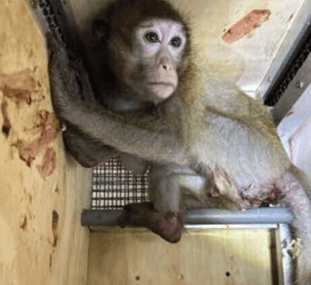Charles River Laboratories Skirts U.S. Law by Laundering Bio Specimens Through Canada
For Immediate Release:
November 21, 2024
Contact:
Tasgola Bruner 202-483-7382
In a letter sent today, PETA urges the U.S. Fish and Wildlife Service and Environment Canada, the authorities responsible for upholding the Convention on International Trade in Endangered Species (CITES) treaty, to close a specimen-laundering loophole that records show Charles River Laboratories has exploited to effectively skirt a de facto ban on importing Cambodian-origin endangered macaque monkeys into the U.S.
PETA, a Charles River shareholder, will also submit a resolution on Monday urging that the company reveal the true origins of its imported monkeys, as well as any biological specimens derived from them.
PETA has obtained records revealing that Charles River, one of the world’s largest importers and suppliers of monkeys for experimentation, employed a complex international scheme to bypass U.S. import restrictions. The company shipped nearly 7,000 Cambodian-origin monkeys to Canada and subsequently imported tens of thousands of blood samples, tissues, and bodily fluids derived from Cambodian monkeys into the U.S.
Records reveal that starting in February 2023, U.S. Fish and Wildlife authorities began denying re-export permits for live Cambodian-origin macaques and specimens imported months earlier by companies including Charles River, LabCorp, Altasciences, Worldwide Primates, and Envigo. These denials were based on concerns that the original imports may have violated CITES treaty regulations. However, during the same period, U.S. Fish and Wildlife authorities accepted re-export permits issued by Canadian authorities, enabling Charles River to funnel Cambodian-origin specimens into the U.S.

“Charles River is flouting the law, putting two nations at risk from dangerous pathogens and potentially violating international treaties, and federal agencies are allowing it,” says PETA Senior Science Advisor and primate scientist Dr. Lisa Jones-Engel. “PETA calls on U.S. and Canadian officials to stop enabling this North American monkey laundering scheme and close this absurd loophole now.”
The U.S. Fish and Wildlife Service imposed the de facto ban because there’s no way to prove whether monkeys imported from Cambodia were illegally kidnapped from forests or bred on squalid, disease-ridden monkey farms. However, the agency has failed to apply the same scrutiny to specimens taken from the monkeys, although they are covered under the same import regulations. PETA urges the authorities to seize all Cambodian-origin monkey specimens that have entered the U.S., as they cannot be reasonably determined to have been from legally acquired animals.
PETA—whose motto reads, in part, that “animals are not ours to experiment on”—points out that Every Animal Is Someone and offers free Empathy Kits for people who need a lesson in kindness. For more information, please visit PETA.org or follow PETA on X, Facebook, or Instagram.


